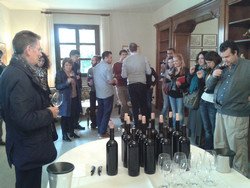New yeast and bacterial starters developed for truly wild European wines
Traditionally, wines were produced by the resident grape or winery microbiota unique to a given area. However the development of industrial-scale wine production has led the commercial starter cultures, Saccharomyces cerevisiae and Oenococcus oeni, to be widely used to ensure a more manageable process. Although this offers advantages in terms of ease of production, it also means that wines from very different regions can begin to taste alike. Consumer studies have shown that there is now a real desire for ‘wild-ferment’ wines which represent the region that they are from on the market. That’s why the WILDWINE team spent the past three years exploring how we could use indigenous wild yeasts and lactic acid bacteria (LAB) as a tool to create wine complexity and authenticity distinct to particular regions. The WILDWINE consortium comprised various SME associations or groupings (SME-Ags) from different regions in the wine-producing countries of Greece, Spain, France and Italy. And each of these SME-Ags is now set to benefit from the WILDWINE outcomes. Project coordinator Dr. Chrysoula Tassou and scientific coordinator Dr. Aspasia Nisiotou both with the Hellenic Agricultural Organisation-DEMETER note, ‘Special yeast and bacterial starter blends were developed for each of the participating SME-AG. The novel starter blends conferred to the wines special attributes that significantly differentiated them from their respective counterparts fermented with commercial starters.’ WILDWINE’s newly-designed microbial starter blends were tested at pilot scale during the production of wines at the premises of the wineries. Both bacterial and yeast strains dominated the indigenous microbiota thus driving the fermentation. The starter blends can be directly used following the implantation process. Before advancing on the project, the team studied consumer demand and knowledge on the subject and it became clear that there is a strong appetite for ‘wild-ferment’ wines. ‘According to the results,’ Dr. Tassou notes, ‘Consumers were adequately informed about the existence and the impact of indigenous microbiota on the organoleptic characteristics of wines. At the same time the survey showed that consumers aimed to choose wines produced from non-commercial yeasts instead of the conventional ones.’ Enabling regional wineries to produce the wild ferment wines from indigenous wild yeasts allows wineries to offer a truly unique product. Dr. Tassou comments, ‘The use of selected indigenous microbiota in wine production will enable SME-Ags to diversify and deliver safe wines of premium quality for EU and global markets. This is because the proposed method takes into consideration the basic motivation behind consumer choice for premium wines made according to natural, less interventionist techniques. The use of regional yeast/bacteria starter blends specially designed for each participant SME-AG allow for the production of a “one of a kind” product.’ Such products improve the competitiveness and internationalisation of SMEs and enhance their reputation among consumers, ultimately allowing industries to increase sales and expand to new markets. The project wrapped up at the end of July and now it’s over to the SME-Ags to move from pilot to commercial scale production and launch a new product on the market. As the WILDWINE tagline tells us, ‘The European wines are back…and they are wild’. For further information, please visit: WILDWINE http://www.wildwine.eu/en/(opens in new window)
Countries
Greece



